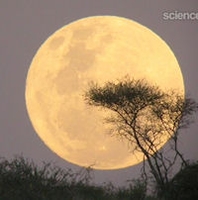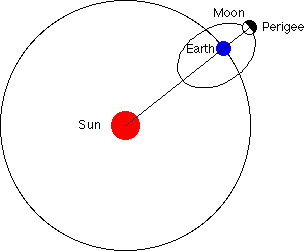
So? What’s been happening in the natural world recently? Well, May 5th/6th 2012 brought with it the brightest New Moon of the year. The so-called Super Moon is a phenomenon that occurs approximately once every year. It is, in fact, the same old Moon we see every night but due to the fact that it is closer to the Earth than usual it appears 14% bigger and 30% brighter.
This Super Moon – or ‘perigee moon’ as it is actually called – appears bigger because of the oval shape of the Moon’s orbit around the earth. The Moon follows an elliptical orbit with one side, the ‘perigee’ c. 50,000kms closer that the opposite, or ‘apogee‘, side. To add to the optical illusion, perigee moons also look even larger when they are close to the horizon and shine through trees and behind buildings or monuments. Have a look at some amazing photographs of the May 2012 Perigee Moon as seen all around the world in association with all sorts of famous landmarks- Super Moon Rises in Pictures
WHERE WOLF?
The Moon has a long reputation for causing all sorts of disturbances as it changes. This is so widely accepted that many of the words we use to describe madness – such as ‘lunacy’ – are based on the Latin word, ‘luna’, which means moon. According to our ancestors, the phases and changes of the Moon could radically alter human and animal behaviour – and usually not for the better.
However, there is little scientific evidence to support these stories. Modern scientists can’t reliably find any correlation between human or animal behaviour and the waxing and waning of the Moon. And though, at all times, the Moon does have an influence on the tides in the oceans of the world, even the ‘perigean tides’ associated with Super Moons will usually only pull tide waters just a few centimeters higher than usual.
___________________________________________________________________________________
http://en.wikipedia.org/wiki/Supermoon
http://science.nasa.gov/science-news/science-at-nasa/2012/02may_supermoon/
http://www.psychologytoday.com/articles/200502/full-moon-crazy

